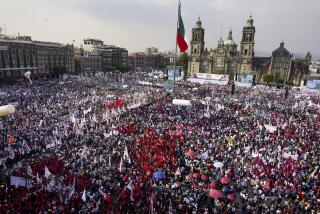Bond Deal to Reduce Burden by Only a Fraction, Experts Say : Debt Plan Provides Mexico Little Relief
- Share via
MEXICO CITY — Euphoria over a new plan to reduce payments on Mexico’s foreign debt has been replaced here by the somber realization that solutions to the country’s economic problems are beyond the plan’s reach.
The plan, announced with much fanfare at the end of 1987, permits Mexico to buy its debt back from banks, using $10 billion in bonds purchased for $2 billion from the U.S. government. With Mexican debt selling at about half its value, Mexico conceivably could wipe out $20 billion in debt with just the $10 billion in bonds. In all, Mexico owes foreign private and government creditors about $105 billion, according to the World Bank.
Political columnist Adrian Lajous called the debt-bond scheme “the miracle of the fishes” because of the multiplication of benefits from the $2-billion investment.
But the miracle has its limits, economic observers here say.
If things go according to plan, payments on Mexico’s debt will be reduced by between $500 million and $800 million a year, economists estimate. The amount is small in light of the fact that Mexico pays from $10 billion to $13 billion annually on its debt, depending on interest rates.
The chances of expanding the program to further reduce payments seem remote. Smaller, regional banks that have tired of uncertain repayment prospects are more likely to take the opportunity of trading away their loans than are large U.S. banks, which apparently are unwilling to commit themselves to selling their Mexican loans cheaply.
“This is sort of a mopping-up exercise for the small banks,” a foreign banker here said.
As for its immediate effect on Mexico’s economic ills, the country’s former secretary of finance, Jesus Silva Herzog, called the plan “positive, without a doubt, but not of great importance.”
Mexico’s economy is in the grip of high inflation and virtual stagnation. Beyond the foreign debt payments is an array of burdens that have kept the country in recession for five years. The government of President Miguel de la Madrid, facing an increasingly impatient populace in a presidential election year, can promise little improvement.
Huge Debt Service
Uncertainty over the price of oil, Mexico’s chief export, makes it difficult to project this year’s economic performance. The economy grew by less than 2% in 1987, and many economists expect the same slow rate of growth this year. Such snail’s-pace expansion fails to provide the 1 million jobs a year needed to accommodate the growing labor force.
A recession in the United States, Mexico’s biggest customer for a wide range of exports, would further darken an already black economic picture.
Inflation topped 150% last year, and the De la Madrid government is struggling to slow the rate of price increases. One roadblock: The government must make payments on a growing domestic debt incurred to cover chronic budget deficits. Servicing that debt contributes to high interest rates that make borrowing for investment costly.
The government has promised to reduce its spending this year, but some economists believe that the deficit for 1988 will be the highest ever, further stimulating inflation.
A shock treatment of controls on wages and prices is scheduled to go into effect in March. The goal is to show that runaway price increases are at an end. But workers, smarting from a pay increase that equaled barely half of a recent increase in prices, are resisting the program.
Demonstrations against the government’s plans take place with increasing frequency in the capital. Not since protests over the slow pace of reconstruction following twin earthquakes in Mexico City in 1985 have there been such demonstrations.
The turbulence is seen to be interfering with the triumphal march of the ruling Institutional Revolutionary Party to the presidential elections scheduled for July. Threats of further protests by opposition parties have brought warnings from officials of the PRI, as the party is known, against upsetting “social peace.”
Jorge de la Vega, president of the PRI, lashed out last week against planned “civil disobedience” campaigns in northern Mexico denouncing the government’s economic policy. He called on the authorities to crack down on what he termed “subversion, disorder and provocation.”
De la Vega said it was unseemly for opposition parties to use Mexico’s economic problems as a vote-getting tool. “We don’t need to profit by the crisis and problems of Mexico in order to obtain electoral advantage,” he said.
But the PRI presidential candidate, Carlos Salinas de Gortari, is hearing complaints about inflation at almost every campaign stop.
More to Read
Sign up for Essential California
The most important California stories and recommendations in your inbox every morning.
You may occasionally receive promotional content from the Los Angeles Times.













